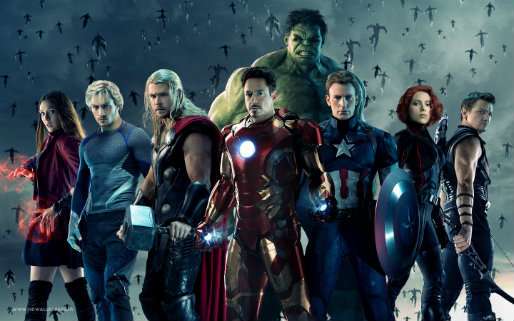Peter Suderman Reviews Avengers: Age of Ultron

Marvel's latest superhero megamovie, Avengers: Age of Ultron, is set to smash all sorts of box office records this weekend, surpassing even the super-earnings of its predecessor.
I enjoyed the new one, but in general I think it's weaker than the first film, which, despite being a multi-movie crossover event, maintained a clarity and a light touch that this one just can't quite manage.
From my review:
'The Avengers" was not only one of the most successful blockbusters in years, but it was also one of the best. Writer-director Joss Whedon, the geek auteur behind television's "Buffy the Vampire Slayer" and "Firefly," delivered a film that balanced, with almost superhuman ability, the franchise's need for mammoth spectacle on one hand and careful character-building on the other.
It was a movie that demonstrated that it understood its cast of iconic comic book characters just as well as anyone in the audience, and that it cared about them in the same ways — and with the same intensity — that lifelong fans did.
Yet it was also easily accessible and enjoyable for those not steeped in Marvel Comics lore. It was a perfect summer blockbuster and a perfect comic book movie at the same time.
The sequel, "The Avengers: Age of Ultron," once again written and directed by Mr. Whedon, shows a similar regard for its characters and an equal zeal for effects-driven destructive spectacle, but it has a harder time balancing its many imperatives.
Like its predecessor, "Age of Ultron" is alternately intimate and bombastic, funny and thrilling, with grand action sequences punctuated by genuine laughs. Many of the scenes showcase Mr. Whedon's ear for zippy, character-defining dialogue.
With his TV background, his heavy reliance on quippy back-and-forths and his frequent use of scene-capping monologues, Mr. Whedon sometimes comes across as the Aaron Sorkin of the superhero set.
Read the complete review in The Washington Times.
Something I mentioned in my review but didn't really get to discuss is how overloaded the movie is with super-characters. In addition to the four Avengers heroes who have starred in their own films (Captain America, Thor, Hulk, Iron Man), and the S.H.I.E.L.D. characters (Black Widow, Hawkeye, Nick Fury), who have been in previous Marvel movies, the movie introduces three more super-characters (The Vision, Quicksilver, Scarlet Witch) and two new villains (Ultron, and another character who I won't reveal but who will appear more prominently in a future Marvel movie).
We're only two event-films in, and we're already approaching the point of overload. It's really a lot to follow, and a lot to manage, even if you've seen all 10 of the previous Marvel movies, and kept an eye on Marvel's primary Avengers tie-in TV series, Agents of S.H.I.E.L.D.
And if you haven't, you're virtually certain to be totally lost. The opening sequence is an extended battle against a horde of Hydra agents led by Baron von Strucker, neither of whom the script makes any attempt to identify. Hydra has appeared in several Marvel films before, but wasn't in the last Avengers movie. Von Strucker, meanwhile, has only previously appeared in a single 90-second bit during the credits sequence of Captain America: The Winter Soldier. So if you haven't seen the last Captain America movie, or even if you did, but you left when the credits started to roll, you're not going to know what's going on.
On the one hand, this suggests a fairly high degree of respect for the audience's ability to follow complicated continuity, and it's a victory of sorts for the sort of sprawling, complex, multi-threaded storytelling that moviemakers used to assume that audiences were far too dumb to grasp.
On the other hand, I do wonder whether this will eventually start to limit the accessibility and appeal of Marvel's continuity-heavy shared-universe storytelling. Comic books (the paper kind) do this sort of thing pretty regularly, and the deep fans tend to love it, but it tends to limit the ability of casual viewers to jump in. It's not that viewers aren't smart enough to get it; it's that it requires a kind of commitment to comprehensive viewing that isn't always possible.
This is increasingly going to be an issue for Marvel (and its competitors). Next year, a bunch of these characters (plus some new ones) will face off against each other in Civil War. And in the years after that, Marvel plans to integrate a ton of new characters from its cosmic line, including the Guardians of the Galaxy and The Inhumans, who will all meet up in the next Avengers movie, technically movies, a two-part extravaganza about the Infinity Gauntlet. If you're reading this and you're not a comic book geek, you're probably lost already.
The point is, the more movies and tie-ins that Marvel produces, the more complex the cinematic world will be — and the bigger the buy-in necessary to really appreciate everything that's going on. The first Avengers film balanced this just about perfectly; the second shows how difficult it has already become to maintain that balance.


Show Comments (195)